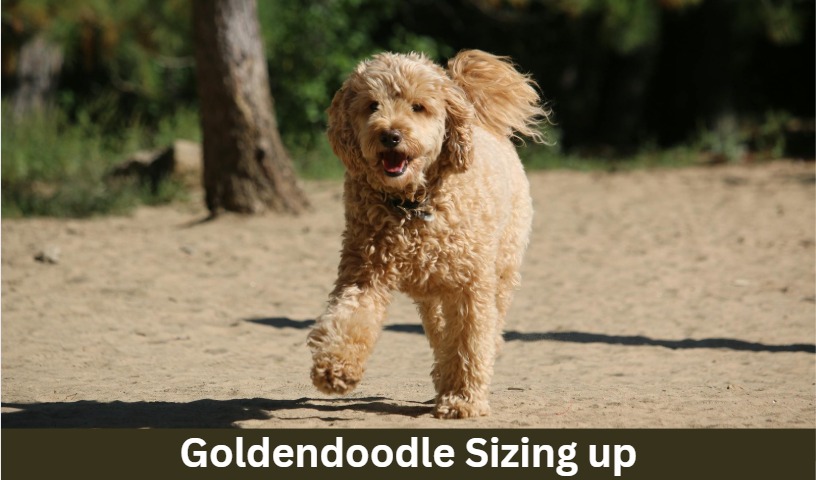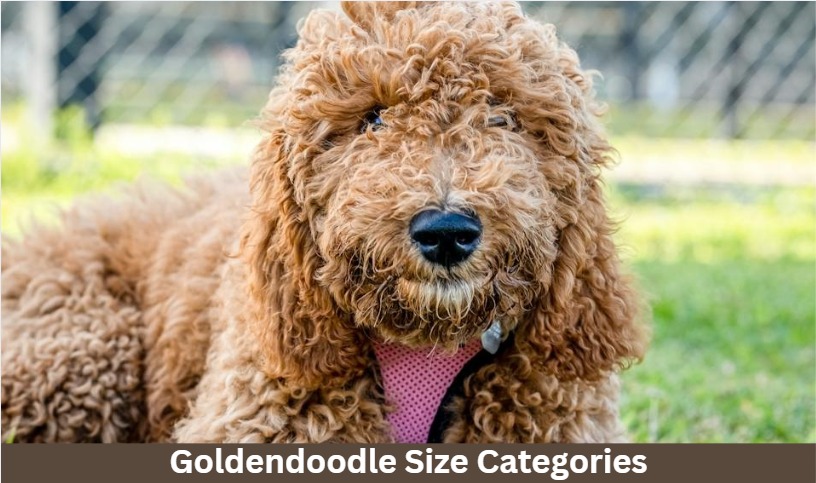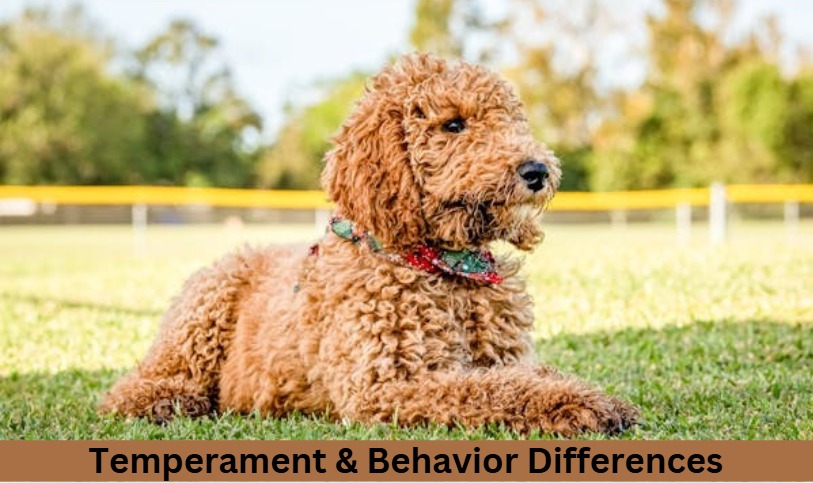
Introduction
Sizing up the Goldendoodle breed. Calling all Goldendoodle fans! Whether you’re already dreaming of bringing home one of these fluffy companions or just love learning about dogs, you’ve landed in the perfect place. Let’s cut to the chase: How big do Goldendoodles get?
Quick Factors/Key Takeaways Table
| Factor | Standard Goldendoodle | Medium Goldendoodle | Mini Goldendoodle |
|---|---|---|---|
| Height & Weight | 20–24 inches, 50–90 lbs | 17–20 inches, 35–50 lbs | 13–17 inches, 15–35 lbs |
| Best For | Active families, outdoor enthusiasts, homes with yards | Families with kids, small yards, balanced lifestyles | Apartments, seniors, travelers, city living |
| Exercise Needs | 1–2 hours daily (running, swimming) | 45–60 minutes daily (walks, playtime) | 30–45 minutes daily (short walks, indoor games) |
| Temperament | Calm, patient, independent | Gentle, adaptable, kid-friendly | Affectionate, may bark if anxious |
| Common Health Issues | Hip dysplasia, joint problems | Allergies, ear infections | Hypoglycemia, dental crowding |
| Lifespan | 10–12 years | 11–13 years (estimated) | 12–15 years |
| Grooming Needs | Daily brushing, 80 – 80–120 every 6–8 weeks | 2–3x/week brushing, 70 – 70–100 every 8 weeks | 3x/week brushing, 50 – 50–80 every 8–10 weeks |
| Initial Cost | $1,500–$2,500 | $1,800–$3,000 | $2,000–$3,500 |
| Monthly Costs | Food: $70, Grooming: $70, Vet: $50 | Food: $50, Grooming: $85, Vet: $45 | Food: $30, Grooming: $75, Vet: $45 |
| Training Difficulty | Easy with consistency | Moderate, adaptable to training | May need extra patience (housebreaking) |
| Pros | Loyal, great with kids, hypoallergenic | Balanced energy, family-friendly | Portable, low shedding, travel-friendly |
| Cons | Needs space, higher food costs | Moderate shedding, ear care needed | Prone to separation anxiety, dental issues |
Key Takeaways
- Size Matters: Mini Goldendoodles suit small spaces, Standards thrive outdoors, Mediums offer a middle ground.
- Health & Lifespan: Minis live longer but need dental care; Standards require joint health attention.
- Budget: Minis cost more upfront but less monthly; Standards have higher long-term expenses.
- Temperament: Larger = calmer; Smaller = clingier (train early to avoid barking).
- Grooming: Curly coats shed less but need frequent brushing; size impacts grooming costs.
Tip: Always ask breeders for parent size records to predict your puppy’s growth!
What is a Goldendoodle?
A Goldendoodle is a cross between a Golden Retriever and a Poodle. These dogs combine the Golden Retriever’s friendly, playful nature with the Poodle’s intelligence and low-shedding coat. Families, singles, and allergy sufferers love Goldendoodles for their loyalty and adaptability.
Why Do Goldendoodles Come in Different Sizes?
Breeders create Goldendoodles in three sizes—Standard, Medium, and Mini—by mixing Golden Retrievers with different-sized Poodles. For example, a Standard Goldendoodle comes from a Golden Retriever and a Standard Poodle, while a Mini Goldendoodle results from a Golden Retriever and a Miniature Poodle. This mix allows owners to choose a dog that fits their living space, activity level, and budget.
How Size Affects Your Choice
Larger Goldendoodles need more space and exercise, while smaller ones adapt easily to apartments or travel. Your daily routine, family size, and budget for food or vet care will help you decide which size suits your lifestyle.
Goldendoodle Size Categories
Goldendoodles come in three sizes—Standard, Medium, and Mini—each with unique traits. For a deeper dive into growth patterns and size variations, explore our guide to Goldendoodle sizes.

Standard Goldendoodle
- Height: 20–24 inches
- Weight: 50–90 pounds
- Characteristics: Standard Goldendoodles suit active families or outdoor lovers. They thrive in homes with yards and enjoy activities like hiking, swimming, or playing fetch. Their calm, patient nature makes them great with kids.
Medium Goldendoodle
- Height: 17–20 inches
- Weight: 35–50 pounds
- Characteristics: Medium Goldendoodles balance energy and adaptability. They fit well in homes with small yards and enjoy moderate playtime. Their size makes them sturdy enough for kids but manageable in tighter spaces.
Mini Goldendoodle
- Height: 13–17 inches
- Weight: 15–35 pounds
- Characteristics: Mini Goldendoodles are compact, portable, and ideal for city living. If you’re considering an even smaller option, learn about the pros and cons of Teacup Goldendoodles in our dedicated article. They need less exercise—short walks or indoor play sessions keep them happy. Their small size helps them adapt to travel or apartments.
How Breeders Determine Size
The parent breeds’ sizes decide the outcome. A Standard Poodle parent creates a larger Goldendoodle, while a Miniature Poodle leads to a smaller dog. Even puppies from the same litter can vary slightly in size depending on genetics.
Breeder Insight:
“Always ask for the parents’ weight and height records. A Mini Goldendoodle with a 15-pound Poodle parent will likely stay under 25 pounds,” says Linda from SunnyDoodles Kennel.
Choosing the Right Size for Your Lifestyle
Best for Apartments & Small Homes
Mini Goldendoodles thrive in apartments. Their small size means they need less space, and short walks or indoor games meet their exercise needs. Many apartments have weight limits, and Minis often fit these rules.
Best for Active Owners
Standard Goldendoodles suit runners, hikers, or families with large yards. They need 1–2 hours of daily exercise, like jogging, swimming, or agility training. Their high energy levels make them perfect for adventurous owners.
Best for Families with Kids
Medium Goldendoodles strike a balance. They’re sturdy enough to handle playtime with kids but not so large that they accidentally knock over toddlers. Their gentle temperament makes them great family pets.
Travel-Friendliness
Mini Goldendoodles win here. They fit easily in car carriers, airplane cabins, or hotel rooms. Airlines often allow dogs under 20 pounds in-cabin, making Minis ideal for frequent travelers.
Real Owner Story:
“Our Mini Goldendoodle, Bella, weighs 22 pounds. She rides in a backpack carrier on hikes and stays quiet in our studio apartment. Perfect for city life!” – Mia, New York.
Temperament & Behavior Differences

Does Size Affect Personality?
Yes. Larger Goldendoodles tend to be calmer and more independent, while smaller ones often bond closely with owners and may bark if left alone. Mini Goldendoodles can develop “small dog syndrome” (clinginess or barking) without proper training.
Energy Levels & Exercise Needs
- Standard: Needs 1–2 hours of vigorous exercise daily (running, fetch, swimming).
- Medium: Thrives with 45–60 minutes of playtime (walks, tug-of-war).
- Mini: Happy with 30–45 minutes of activity (short walks, puzzle toys).
Training Difficulty
All Goldendoodles learn quickly with positive reinforcement (treats, praise). However, Mini Goldendoodles may take longer to housebreak due to smaller bladders. Start training early to prevent stubborn habits.
Vet Tip:
“Smaller dogs like Minis need consistency. Use crate training and frequent potty breaks during housebreaking,” advises Dr. Emily Carter, DVM.
Health Considerations
Standard Goldendoodles
- Common Issues: Hip dysplasia, elbow problems, and joint pain.
- Prevention: Avoid overexercising puppies, provide joint supplements like glucosamine, and maintain a healthy weight.
Medium Goldendoodles
- Common Issues: Allergies, ear infections (due to floppy ears).
- Prevention: Clean ears weekly and feed hypoallergenic diets if needed.
Mini Goldendoodles
- Common Issues: Hypoglycemia (low blood sugar), dental crowding.
- Prevention: Feed small, frequent meals (3–4 times daily) and brush teeth 3x/week.
Lifespan
- Mini Goldendoodles: 12–15 years
- Standard Goldendoodles: 10–12 years
Grooming & Coat Maintenance
Curly coats shed less but need brushing 3x/week to prevent mats. While many Goldendoodles have hypoallergenic coats, not all do—discover why in our article, Are All Goldendoodles Hypoallergenic?
Coat Types
- Curly: Rarely sheds but needs brushing 3x/week to prevent mats.
- Wavy: Sheds lightly; brush 2x/week.
- Straight: Sheds more; brush daily to manage loose fur.
Shedding Differences
- Mini & Medium: Shed less due to stronger Poodle genes.
- Standard: May shed slightly more but still considered hypoallergenic.
Grooming Routine
| Size | Brushing | Professional Grooming |
|---|---|---|
| Standard | Daily | Every 6–8 weeks (80–120) |
| Mini | 3x/week | Every 8–10 weeks (50–80) |
Cost of Ownership
Initial Cost
- Standard: $1,500–$2,500
- Mini: $2,000–$3,500 (higher demand for smaller sizes)
Monthly Expenses
| Size | Food | Grooming | Vet Care |
|---|---|---|---|
| Standard | $70 | $100 | $50 |
| Mini | $30 | $75 | $40 |
Training Costs
Mini Goldendoodles may need extra sessions for barking or separation anxiety, costing 50–50–100 per session.
Standard vs. Medium vs. Mini: Which is Right for You?
| Factor | Standard | Mini |
|---|---|---|
| Best For | Active families | Apartments, travel |
| Lifespan | 10–12 years | 12–15 years |
| Annual Cost | $1,500+ | $1,000+ |
Pros and Cons
- Standard Pros: Gentle with kids, loyal. Cons: Needs space, higher food costs.
- Mini Pros: Portable, low shedding. Cons: Prone to separation anxiety.
Conclusion
Final Tips
- Match the dog’s energy to your daily routine. A Standard needs active owners; a Mini suits relaxed lifestyles.
- Budget for grooming, vet visits, and training. Smaller dogs cost less monthly but may have higher upfront prices.
- Meet the puppy’s parents to estimate adult size. Genetics play a huge role in growth.
Questions to Ask Before Adopting
- Do I have time for daily walks?
- Can I handle potential health issues like hip dysplasia or dental problems?
- Does my home have enough space for a large dog?
Goldendoodles adapt to nearly any home. Choose the size that fits your life, and enjoy years of love, play, and loyalty!
References
- American Kennel Club (AKC)
- Goldendoodle Association of North America
- Interview with Dr. Emily Carter, DVM
- SunnyDoodles Kennel Breeding Guidelines
Frequently Asked Questions (FAQs)
1. Can Goldendoodles live in hot/cold climates?
Goldendoodles adapt well to most climates but need extra care in extremes. In hot areas like Arizona, provide shade, water, and avoid midday walks. In cold states like Minnesota, use dog coats and limit outdoor time during freezing temps.
2. Are Goldendoodles easy to potty train?
Yes! Their intelligence and eagerness to please make potty training straightforward. Stay consistent with schedules and reward success with treats. Crate training speeds up the process.
3. Do Goldendoodles like to swim?
Many Goldendoodles love swimming, thanks to their Golden Retriever genes. Introduce them slowly to water and use a dog life vest for safety. Always supervise them near pools or lakes.
4. How to stop a Goldendoodle from chewing furniture?
Redirect chewing to durable toys and use bitter apple spray on furniture. Puppy-proof your home and ensure they get enough exercise to curb boredom.
5. Is pet insurance worth it for a Goldendoodle?
Yes, especially for Mini Goldendoodles prone to dental issues or Standards at risk for hip dysplasia. Compare plans to cover emergencies or chronic conditions—it beats surprise $3,000 vet bills.





Leave a Reply